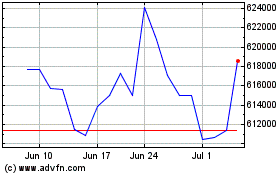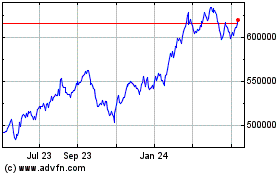By Nicole Friedman
Warren Buffett intensified his attacks on Wall Street money
managers Saturday, saying that investors wasted more than $100
billion over the last decade on expensive advice.
The billionaire devoted a large section of his widely read
Berkshire Hathaway shareholder letter to arguments against stock
pickers that charge high management fees and fail to beat the
broader market.
He also declared victory in his $1 million bet with another
asset manager that low-cost index funds would out earn hedge funds
over the span of a decade.
"The bottom line," Mr. Buffett wrote, is that "when trillions of
dollars are managed by Wall Streeters charging high fees, it will
usually be the managers who reap outsized profits, not the
clients."
The 86-year-old Mr. Buffett, whose shrewd investments have
earned him the nickname "the Oracle of Omaha," returned to several
favorite topics with trademark folksiness in his 27-page letter. He
reiterated his optimism about the future of America, rebuffed
criticisms of share buybacks and declared that he has not committed
to holding any of Berkshire's stock investments forever.
His goal, he said, is to deliver significant earnings growth
over time and predicted that will come in fits and starts. "Every
decade or so," he writes, "dark clouds will fill the economic
skies, and they will briefly rain gold. When downpours of that sort
occur, it's imperative that we rush outdoors carrying washtubs, not
teaspoons. And that we will do."
Berkshire's net earnings rose nearly 15% in the fourth quarter,
boosted in part by the stock market's end-of-year gains, but the
conglomerate's results were roughly flat for the full year. Net
earnings were $24.07 billion in 2016 as compared with $24.08
billion in 2015.
Book value, a measure of assets minus liabilities that is Mr.
Buffett's preferred yardstick for measuring net worth, rose 10.7%
in 2016, compared with a 12% total return in the S&P 500,
including dividends.
One big reason for the flat performance was a decline in
earnings for Berkshire's BNSF railroad subsidiary. Net earnings at
Berkshire's railroad fell 16% in 2016 due largely to a drop in coal
demand. Mr. Buffett didn't mention BNSF's top executives by name,
as he has in past letter. Mr. Buffett tends to only name managers
when he is praising them.
He did tout the performance of his insurance chief, Ajit Jain,
widely considered to be one of the leading candidates to take the
Berkshire CEO job when Mr. Buffett is no longer on the scene, and
noted that "float" from the conglomerate's insurance operations
exceeded $100 billion for the first time in 2017. Berkshire can
invest that money and keep any profits.
Investment gains declined for the year, partly because Berkshire
recorded such a large one-time gain in 2015 due to holdings in
Kraft Heinz Co. One of the biggest investments made by Berkshire
over the past year was the amassing of a stake in tech giant Apple
Inc., which then soared to a record high on better-than-expected
iPhone sales and building anticipation for the next edition of the
phone.
Mr. Buffett has long said his preferred time period for holding
a stock is "forever" but he noted in the letter that there can be
exceptions.
"It is true that we own some stocks that I have no intention of
selling for as far as the eye can see," he wrote. "But we have made
no commitment that Berkshire will hold any of its marketable
securities forever."
Mr. Buffett took on the subject of share repurchases and
dismissed arguments that buybacks are diverting funds from more
worthwhile expenditures. Berkshire, he said, is still willing to
buy back its shares if prices fall below 120% of book value. Based
on his latest estimate of book value, the buyback threshold stands
at roughly $207,000 per Class A share. Class A shares closed Friday
at $255,040.
Mr. Buffett praised some companies, including Bank of America
Corp., for buying back shares. "Some people have come close to
calling [buybacks] un-American -- characterizing them as corporate
misdeeds that divert funds needed for productive endeavors," Mr.
Buffett said. "That simply isn't the case."
Berkshire has warrants to buy 700 million shares of Bank of
America at $7.14 apiece. The stock closed Friday at $24.23, so Mr.
Buffett is looking at a paper gain of about $12 billion. Mr.
Buffett in his letter said he would consider exercising the
warrants if Bank of America raises its dividend to 44 cents from
30, and would exchange Berkshire's Bank of America preferred shares
to fund the transaction. A Bank of America spokesman declined to
comment.
There were a few topics Mr. Buffett avoided in his annual
letter. He said nothing about potential successors or when he might
step down as chief executive. The longtime Democrat also refrained
from directly commenting on politics despite his criticism of
President Donald Trump during last year's campaign. He attributed
America's "miraculous" economic growth to "human ingenuity, a
market system, a tide of talented and ambitious immigrants, and the
rule of law."
He instead saved his sharpest comments for pricey money managers
who pledge to beat the market, saying that in his lifetime he has
identified "ten or so professionals" who can do so successfully.
Mr. Buffett became one of the world's richest people by investing
in undervalued stocks and buying companies.
"If 1,000 managers make a market prediction at the beginning of
a year, it's very likely that the calls of at least one will be
correct for nine consecutive years," he wrote. "Of course, 1,000
monkeys would be just as likely to produce a seemingly all-wise
prophet. But there would remain a difference: The lucky monkey
would not find people standing in line to invest with him."
Invariably, he wrote, management fees eat into investors'
returns. He took aim at a popular target, the hedge fund "two and
twenty" structure, where a manager charges an annual 2% of assets
plus 20% of profits earned.
In 2007 Mr. Buffett bet $1 million that his chosen index fund,
the Vanguard 500 Index Fund Admiral Shares, would outperform hedge
funds over the next decade. The firm that took the other side of
that bet, Protégé Partners, chose five funds of hedge funds. Such
funds charge an additional layer of fees on top of those charged by
each hedge fund.
None of those five funds outperformed the S&P 500 since the
start of the bet, Mr. Buffett said in his letter. There is "no
doubt" he will win the contest when it concludes Dec. 31, he added.
The proceeds will go to the winner's chosen charity.
More investors are heeding Mr. Buffett's advice as they lose
faith in traditional money managers. Investors pulled a net $342.4
billion from U.S.-based actively managed funds last year, according
to Morningstar, while pouring a record $505.6 billion into
U.S.-based passively managed funds.
The biggest beneficiary of this shift is Vanguard Group, which
started the first index fund for individual investors 40 years ago.
At the end of January its assets reached a record $4 trillion,
following a year when Vanguard's funds pulled in more new money
than all rivals combined.
Mr. Buffett in his letter Saturday praised Vanguard founder Jack
Bogle as a "hero."
"If a statue is ever erected to honor the person who has done
the most for American investors, the handsdown choice should be
Jack Bogle."
Write to Nicole Friedman at nicole.friedman@wsj.com
(END) Dow Jones Newswires
February 25, 2017 13:48 ET (18:48 GMT)
Copyright (c) 2017 Dow Jones & Company, Inc.
Berkshire Hathaway (NYSE:BRK.A)
Historical Stock Chart
From Mar 2024 to Apr 2024

Berkshire Hathaway (NYSE:BRK.A)
Historical Stock Chart
From Apr 2023 to Apr 2024
